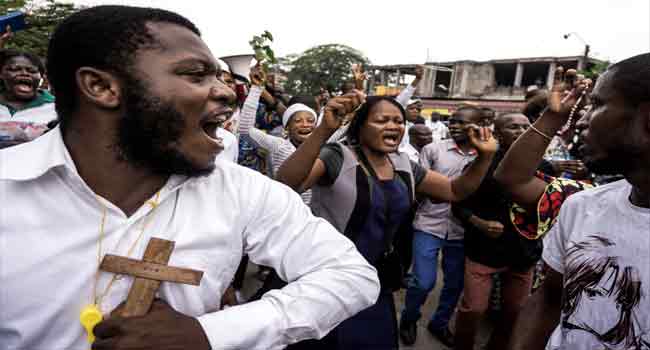Catholic Church Fury In DR Congo After Bloody Crackdown

The death toll from a crackdown on New Year’s Eve demonstrations in Democratic Republic of Congo rose to 12, protestors said on Tuesday, as the country’s powerful Catholic Church condemned what it called “barbarism” and the UN and France sounded their concern.
“Eleven people died in Kinshasa and one in Kananga,” Jonas Tshombela, a spokesman for the protest organisers, told AFP.
Catholic and opposition groups on Sunday defied a ban on demonstrations demanding that President Joseph Kabila — in power since the assassination of his father in 2001 — leave office.
They were met with a deadly crackdown by authorities, who fired tear gas into churches and bullets in the air to break up gatherings.
An AFP reporter at a demonstration in the central city of Kananga saw a man shot in the chest by soldiers who opened fire on worshippers.
The protests took place on the first anniversary of a Church-brokered deal under which Kabila was scheduled to leave office in 2017 after fresh elections.
The poll has since been postponed until December 2018. Western powers have accepted the delay with reluctance, hoping it will avoid bloodshed and encourage stability in this vast and volatile central African country.
In contrast to the toll given by the protestors, the United Nations said in a statement that “at least five people” were killed, several wounded and more than 120 arrested.
Police spokesman colonel Rombaut-Pierrot Mwanamputu, said that “no deaths” had occurred in the context of the demonstrations.
On Sunday, he had said three civilians — “robbers” and “looters” — had been killed, in incidents that had occurred far from the protests. The DRC authorities also say a policeman was killed when a police station came under “attack.”
Church anger
The Roman Catholic archbishop of Kinshasa, Laurent Monsengwo Pasinya, issued an angry statement, saying that the marches had been “peaceful and non violent.”
“How can we have confidence in leaders who are incapable of protecting the population and guaranteeing peace and justice?” he said.
“It is time that truth replaces systematic lies and that mediocre people leave so that peace and justice reign in DR Congo.”
“We can only denounce, condemn and stigmatise the behaviour of our supposedly courageous men in uniform, who, sadly, and no more or less, are channelling barbarism,” he said.
The episcopate, gathering the country’s bishops, said “vile acts” had been committed.
“Freedom of worship, guaranteed in every democratic state, was assailed, churches were desecrated and members of the faithful, including altar boys and priests, were physically assaulted,” it said, demanding a “serious and objective investigation.”
The internet was restored on Tuesday three days after Telecommunications Minister Emery Okundji ordered mobile operators to cut internet and SMS services “for reasons of state security.”
In its statement, the UN reiterated its appeal to “all Congolese actors” to adhere to the December 31, 2016 agreement — “the only viable path to the holding of elections, the peaceful transfer of power and the consolidation of stability in the DRC.”
France, too expressed its concern about the violence and the election timetable, saying the right to peaceful protest “is an essential component of democracy.”
Despite pressure from abroad, the authorities seem intent on pursuing a clampdown, flooding cities with police and troops whenever the opposition tries to make a show of strength, analysts said.
The last demonstrations on any great scale were in July 2016, when veteran opposition leader Etienne Tshisekedi, who died in Brussels the following year, returned home.
“The major deployment of police, army and military gear aims at discouraging people who are tempted to go out and demonstrate,” said Congolese analyst Jacques Wondo.
But “this repression has its limits,” he said, contending that over the long term, the cost of this wide-scale operation would strain the government’s coffers.
Vital Kamerhe, head of the third biggest opposition party in parliament, argued that the presence of priests in Sunday’s demonstrations showed that the protest movement had gone into “higher gear.”
“We (the opposition groups) have to get together and set in place a new strategy, in unity,” he told AFP.
“With each step we have to amend our mistakes. We have to turn out in droves in the face of these mercenaries,” he said, referring to the security forces.
No comments:
Post a Comment